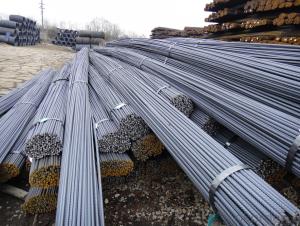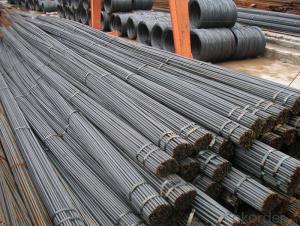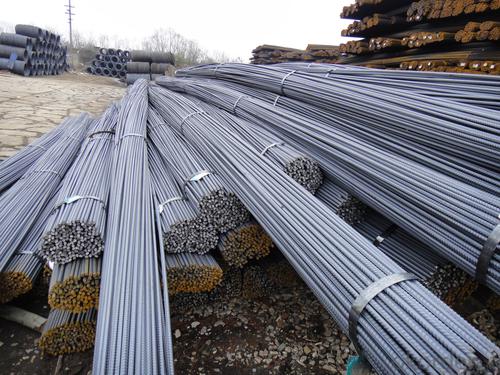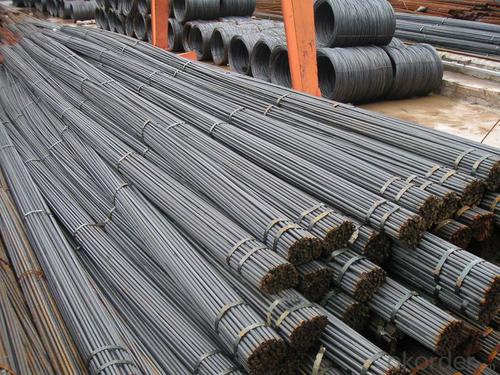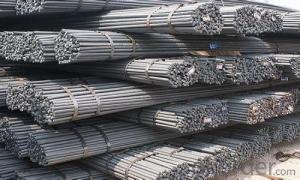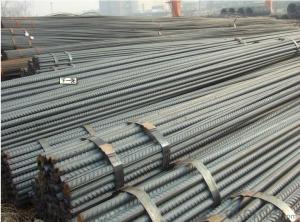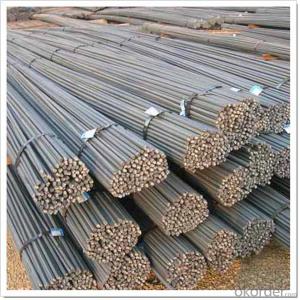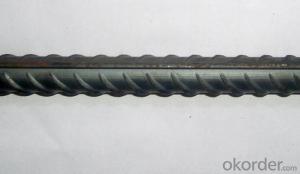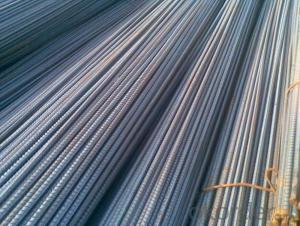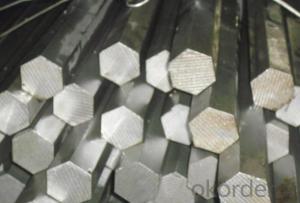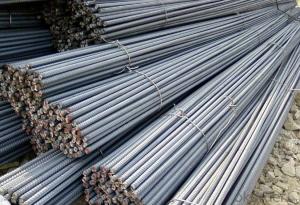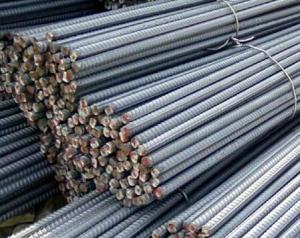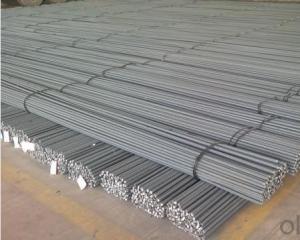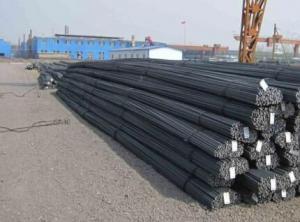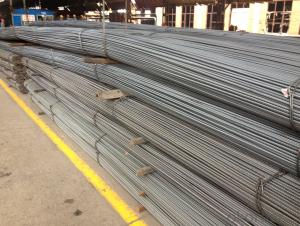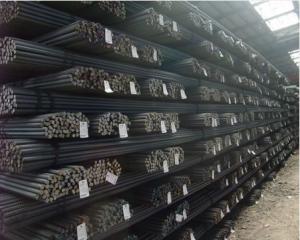Hot Rolled Carbon Steel Deformed Bar 32mm with High Quality
- Loading Port:
- China Main Port
- Payment Terms:
- TT or LC
- Min Order Qty:
- 25 m.t.
- Supply Capability:
- 20000 m.t./month
OKorder Service Pledge
OKorder Financial Service
You Might Also Like
Product Description:
OKorder is offering Hot Rolled Carbon Steel Deformed Bar 32mm with High Quality at great prices with worldwide shipping. Our supplier is a world-class manufacturer of steel, with our products utilized the world over. OKorder annually supplies products to European, North American and Asian markets. We provide quotations within 24 hours of receiving an inquiry and guarantee competitive prices.
Product Applications:
Hot Rolled Carbon Steel Deformed Bar 32mm with High Quality is widely used in buildings, bridges, roads and other engineering construction. Big to highways, railways, bridges, culverts, tunnels, public facilities such as flood control, dam, small to housing construction, beam, column, wall and the foundation of the plate, deformed bar is an integral structure material. With the development of world economy and the vigorous development of infrastructure construction, real estate, the demand for deformed bar will be larger and larger..
Product Advantages:
OKorder's Hot Rolled Carbon Steel Deformed Bar 32mm with High Quality are durable, strong.packed and suitable for construction
Main Product Features:
· Premium quality
· Prompt delivery & seaworthy packing (30 days after receiving deposit)
· Can be recycled and reused
· Mill test certification
· Professional Service
· Competitive pricing
Product Specifications:
Manufacture: Hot rolled
Grade: HRB335 HRB400 BS4449 Grade460 ASTM Grade40 Grade60
Certificates: ISO, SGS, BV, CIQ
Length:6m 8m 9m 12m
Packaging: Export packing, packed by coil
FAQ:
Q1: Why buy Materials & Equipment from OKorder.com?
A1: All products offered byOKorder.com are carefully selected from China's most reliable manufacturing enterprises. Through its ISO certifications, OKorder.com adheres to the highest standards and a commitment to supply chain safety and customer satisfaction.
Q2: How do we guarantee the quality of our products?
A2: We have established an advanced quality management system which conducts strict quality tests at every step, from raw materials to the final product. At the same time, we provide extensive follow-up service assurances as required.
Q3: How soon can we receive the product after purchase?
A3: Within three days of placing an order, we will begin production. The specific shipping date is dependent upon international and government factors, but is typically 7 to 10 workdays.
Q4: How many tons per bundle?
A4: Around 2-3tons
Q5: How to avoid the rust after deliver the goods to the loading port?
A5: We will keep the goods at the port covered with water-proof material
Q6: What is the chemical composition and physical properties of HRB400?
A6:
Grade | Technical data of the original chemical composition (%) | ||||||
C | Mn | Si | S | P | V | ||
HRB400 | ≤0.25 | ≤1.60 | ≤0.80 | ≤0.045 | ≤0.045 | 0.04-0.12 | |
Physical capability | |||||||
Yield Strength (N/cm²) | Tensile Strength (N/cm²) | Elongation (%) | |||||
≥400 | ≥570 | ≥14 | |||||
Q7:What is chemical composition and physical properties of 500B?
A7:
BS4449 500B | Chemical Composition(%) | ||||
C | Mn | Si | S | P | |
≤0.24 | ≤0.45 | ≤0.16 | ≤0.05 | ≤0.31 | |
Physical capability | |||||
Yield Strength(N/cm²) | Tensile Strength(N/cm²) | Elongation (%) | |||
≥650 | ≥500 | 19 | |||
Q8: What is the chemical composition and physical properties of HRB335?
A8:
HRB335 | Chemical Composition(%) | ||||
C | Mn | Si | S | P | |
≤0.25 | ≤1.60 | ≤0.80 | ≤0.045 | ≤0.045 | |
Physical capability | |||||
Yield Strength(N/cm²) | Tensile Strength(N/cm²) | Elongation (%) | |||
≥335 | ≥490 | ≥16 | |||
Images:
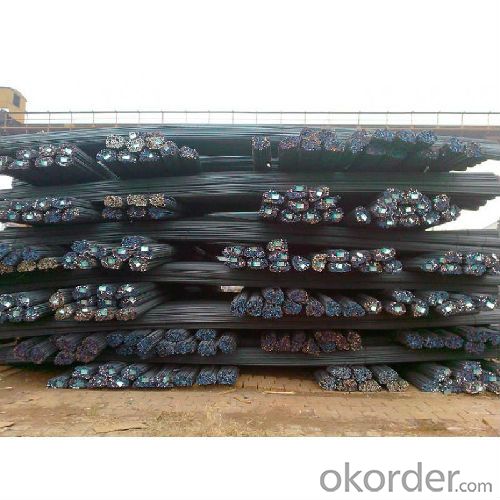
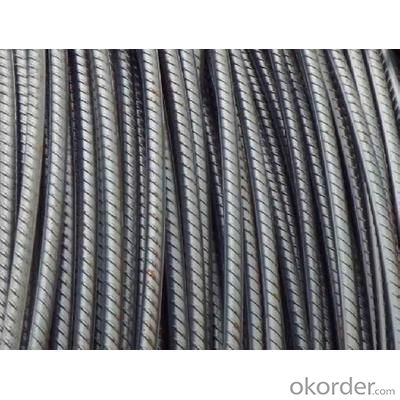
- Q: How are steel rebars protected against alkali attacks?
- Steel rebars are protected against alkali attacks through the use of various techniques and materials. One common method is to apply a protective coating on the surface of the rebars. This coating acts as a barrier, preventing direct contact between the alkaline environment and the steel. Some commonly used coatings include epoxy, zinc, and polyethylene. These coatings are designed to be durable and provide long-term protection against alkali attacks. Another method of protection is through the use of corrosion inhibitors. These inhibitors are added to the concrete mixture during construction. They work by reducing the corrosive effects of alkali on the steel rebars. Corrosion inhibitors form a protective film on the surface of the steel, preventing the alkali from reaching the rebar and causing damage. In addition to coatings and corrosion inhibitors, proper concrete mix design can also play a significant role in protecting rebars against alkali attacks. By optimizing the composition of the concrete mix, engineers can reduce the alkalinity of the environment surrounding the rebars. This helps to minimize the risk of alkali attacks and subsequent corrosion. Regular maintenance and inspection of structures is crucial in ensuring the continued protection of steel rebars against alkali attacks. Monitoring the condition of the rebars and taking prompt action in case of any signs of corrosion or damage is essential for their long-term durability. Overall, a combination of protective coatings, corrosion inhibitors, proper concrete mix design, and regular maintenance are key factors in safeguarding steel rebars against alkali attacks. By implementing these measures, the lifespan and structural integrity of concrete structures can be significantly extended.
- Q: How are steel rebars used in railway track construction?
- Steel rebars are used in railway track construction to reinforce the concrete sleepers or ties that support the tracks. They provide strength and stability to the tracks, ensuring they can withstand the heavy loads and constant vibrations of trains passing over them. The rebars are embedded within the concrete during the sleeper casting process, enhancing the overall durability and longevity of the railway tracks.
- Q: What is the role of steel rebars in load-bearing structures?
- The role of steel rebars in load-bearing structures is crucial and multifaceted. Steel rebars, short for reinforcing bars, are used to provide reinforcement and strength to concrete structures. They are typically made of carbon steel and are strategically placed within the concrete to counteract its low tensile strength and enhance its ability to withstand tension and compression forces. In load-bearing structures, such as buildings, bridges, dams, and other infrastructure projects, steel rebars play several key roles: 1. Reinforcement: Concrete on its own has excellent compressive strength but lacks tensile strength. Steel rebars are embedded within the concrete to absorb tensile forces and prevent cracks from forming or propagating. By reinforcing the concrete, they help distribute and manage the loads more effectively, ensuring the structural integrity and durability of the building. 2. Load distribution: Steel rebars assist in distributing the weight and load-bearing capacity of the structure more evenly. They help to transfer the applied loads, such as the weight of the structure itself, live loads, or environmental forces, to the foundation or other supporting components. This redistribution of forces prevents localized damage and ensures the structure can handle various external and internal loads. 3. Flexibility and ductility: Steel rebars provide flexibility and ductility to the concrete. This means that even if the structure is subjected to heavy loads, vibrations, or external forces, the rebars can absorb and distribute the stress across the structure, minimizing the risk of failure. Steel rebars are particularly effective in areas prone to earthquakes, where they help to absorb and dissipate seismic energy. 4. Longevity and durability: By reinforcing the concrete, steel rebars significantly increase the longevity and durability of load-bearing structures. They help to prevent cracking, shifting, and other structural issues that may arise due to aging, environmental factors, or excessive loading. This extended lifespan ensures the safety and stability of the structure over time. Overall, steel rebars are crucial components in load-bearing structures as they provide reinforcement, enhance load distribution, increase flexibility, and improve the longevity and durability of the structure. Their inclusion allows for the construction of safer, stronger, and more resilient buildings and infrastructure projects.
- Q: Can steel rebars be bent or shaped?
- Yes, steel rebars can be bent or shaped. Rebars are commonly used in construction to reinforce concrete structures, and they are often bent or shaped to fit the specific design requirements of the project. The bending or shaping of rebars can be done using various tools and techniques, such as manual bending, mechanical bending machines, or hydraulic presses. The ability to bend or shape steel rebars allows for the creation of complex and customized reinforcement patterns, ensuring that the concrete structure can withstand the intended loads and stresses.
- Q: How do steel rebars provide reinforcement to concrete?
- Concrete is reinforced by steel rebars, which act as tension members. When loads are applied to the concrete, such as the weight of a structure or external forces, it tends to crack and fail under tension. To counteract this weakness, steel rebars are embedded within the concrete. Made of high-strength steel, the rebars have a much higher tensile strength than concrete. During the pouring of concrete, the rebars are strategically placed throughout the structure, typically in areas where tension forces are expected. These areas include beams, columns, and slabs. As the concrete cures and hardens, it forms a strong bond with the steel rebars. When external forces are exerted on the concrete, like the weight of a building or lateral forces from wind or earthquakes, tension forces are generated within the concrete. However, instead of causing the concrete to crack and fail, the rebars bear the majority of the tension. Due to the high tensile strength of the steel rebars, they can resist the tension forces, preventing the formation of cracks and ensuring the integrity and structure of the concrete. The rebars act as reinforcement by evenly distributing the tensile forces throughout the concrete, enhancing its overall strength and durability. Moreover, rebars offer additional benefits to concrete structures. They can mitigate the effects of temperature changes, prevent shrinkage cracks, and enhance resistance to corrosion caused by environmental factors. In conclusion, the use of steel rebars significantly improves the structural integrity and lifespan of concrete, enabling it to withstand various loads and external forces over time.
- Q: How are steel rebars protected from vandalism during construction?
- Steel rebars are generally protected from vandalism during construction through various measures such as fencing off the construction site, employing security personnel, installing surveillance cameras, and implementing access control systems. Additionally, some construction sites also use anti-vandal coatings or cover the rebars with concrete to make them less accessible and susceptible to damage.
- Q: Can steel rebars be used in earthquake-resistant structures?
- Yes, steel rebars can be used in earthquake-resistant structures. Steel rebars provide strength and reinforcement to concrete structures, helping them withstand seismic forces and prevent collapse during an earthquake. The use of properly designed and installed steel rebars enhances the structural integrity and durability of buildings, making them more resilient to seismic activity.
- Q: What is the role of steel rebars in preventing structural failures?
- The construction industry relies heavily on steel rebars to prevent structural failures. These reinforcing bars, also known as steel rebars, are vital for strengthening and reinforcing concrete structures, ensuring their durability and ability to withstand various forces. One of the main functions of steel rebars is to improve the tensile strength of concrete. While concrete is excellent for compression, it lacks strength in tension. By incorporating steel rebars into concrete structures, this weakness can be overcome by providing resistance to tensile forces. Acting as reinforcements, steel rebars effectively absorb and distribute tensile stresses throughout the structure, preventing the formation of cracks and fractures, and ultimately averting structural failures. Moreover, steel rebars play a critical role in enhancing overall structural stability and preventing failures. By reinforcing concrete, rebars enhance the structural integrity and increase the load-bearing capacity of the structure. This allows the structure to withstand heavier loads and forces, including those caused by natural disasters, extreme weather conditions, or human activities. Steel rebars are also indispensable in preventing structural failures resulting from corrosion. Concrete structures are exposed to various environmental factors, such as moisture, chemicals, and salts, which can cause corrosion of the reinforcing steel. However, as steel rebars are typically coated or protected with anti-corrosive materials, they act as a barrier against corrosion, ensuring the long-term durability and integrity of the structure. Furthermore, steel rebars contribute to preventing structural failures by providing stability during construction. They are strategically placed within the concrete forms at critical points and areas susceptible to high stress. This ensures that the structure remains stable and can withstand the loads and forces exerted during and after construction. In conclusion, the role of steel rebars in preventing structural failures is multifaceted. They enhance the tensile strength of concrete, increase structural stability, prevent corrosion, and provide stability during construction. By reinforcing concrete, steel rebars significantly contribute to the overall strength, durability, and safety of structures, ultimately averting structural failures and ensuring the longevity of the built environment.
- Q: What are the different types of steel rebars used in road bridges?
- There are primarily two types of steel rebars commonly used in road bridges: carbon steel rebars and stainless steel rebars. Carbon steel rebars are the most widely used and cost-effective option, known for their strength and durability. On the other hand, stainless steel rebars are corrosion-resistant, making them suitable for bridges exposed to harsh environmental conditions or those built near bodies of water. Each type of rebar has its own advantages and is selected based on the specific requirements and conditions of the bridge project.
- Q: What are the common problems associated with steel rebars in concrete structures?
- Some common problems associated with steel rebars in concrete structures include corrosion, inadequate cover, improper placement, and improper anchorage. One of the most significant issues is corrosion. Steel rebars are susceptible to corrosion when exposed to moisture and oxygen, especially in harsh environments such as coastal areas or regions with high humidity. Corrosion can weaken the rebars, leading to structural deterioration and reduced load-bearing capacity of the concrete structure. Another problem is inadequate cover, which refers to insufficient concrete cover over the rebars. Inadequate cover can occur due to poor construction practices or design errors. When rebars are not adequately covered, they are more prone to corrosion as they are exposed to external elements. Additionally, inadequate cover can compromise the structural integrity of the concrete, especially in terms of fire resistance and durability. Improper placement of rebars can also cause problems in concrete structures. If rebars are not properly aligned or spaced according to the design specifications, it can result in weak sections within the concrete. This can lead to uneven load distribution and potential structural failure. Improper placement can also hinder the effectiveness of rebars in reinforcing the concrete, compromising the overall strength of the structure. Improper anchorage of rebars is another common problem. Adequate anchorage is crucial to ensure that the rebars effectively transfer the load between different sections of the concrete structure. If the rebars are not properly anchored, they may slip or pull out under stress, reducing the structural strength and stability of the concrete. To mitigate these problems, it is essential to follow proper construction practices and adhere to design specifications. This includes ensuring proper concrete cover, correct placement and alignment of rebars, adequate anchorage, and using corrosion-resistant rebars or protective coatings in corrosive environments. Regular inspections and maintenance are also necessary to detect and address any potential issues with steel rebars in concrete structures.
Send your message to us
Hot Rolled Carbon Steel Deformed Bar 32mm with High Quality
- Loading Port:
- China Main Port
- Payment Terms:
- TT or LC
- Min Order Qty:
- 25 m.t.
- Supply Capability:
- 20000 m.t./month
OKorder Service Pledge
OKorder Financial Service
Similar products
Hot products
Hot Searches
Related keywords
